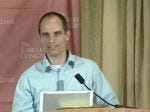Involving university students in research

For the past fortnight I've been mulling over a dilemma.
My university students are currently out on a five week stint in schools, so our 'Literacy across the curriculum' unit is on hold. We've had what I think is a highly stimulating first month, looking in particular at the question 'I'm not an English teacher: is literacy really my business?'.
But what do do when the students return for our last four weeks together?
I've suggested to my students that we vary the original plan and have them doing some research on a literacy-related topic of interest to each of them; but they have let me know that they're worried about workloads and they'd prefer it if we stuck with the original plan which had me sharing with them some of my ideas about writing. I'm worried that the final four weeks will be too passive (teacher presenting, students absorbing); they're worried that the final four weeks (if we follow my later suggestion) will be too over-loaded given the workload they're expecting.
So what to do? How to find a way through this dilemma?
A discussion with my colleague Anita Collins and some mulling over the example set by the wonderful Michael Wesch has given me the beginnings of a glimpse of a way through the fog.
Michael Wesch organises his Digital Ethnography course so that he and his students are involved together in some authentic research. As he writes on his wiki:.
Our goal in this course is to work together to complete the best research project possible. Therefore, given the dynamic nature of ethnographic research, there is no fixed schedule. Even the points below are not fixed. We can redistribute point values at any time. We are simply using points to motivate us all to stay on track and work as well together as we can. Ultimately, our success will not be measured in A's and B's but the quality of our work and its impact on the world.
Could I set things up for the final four weeks so that the students and I are involved in a piece of authentic research together, with me as the co-ordinating spirit (setting the question, suggesting resources, setting up the structure for student inputs), but with the students exploring the question in diverse yet connected ways?
I would draw things together, write up our final report, broadcast it to relevant places in the world; the students would contribute their own thinking coming from their diverse disciplines and perspectives. This would give a focus to their journal writing and so wouldn't vary expectations or add to the volume of their workload (and so would meet some of their concerns about my most recent suggestion); yet it would inject into our final four weeks the necessary element of students actively using what they coming to understand (and so would meet the concerns that I had about the possible passive nature of our original plan).
I think this could work. I'll mull some more.
I'll need to think, for example, about what our central research question might be. In a sense, I think that's the easy part. We're studying literacy across the curriculum, we looked at reading (defined broadly) in the first four weeks, and we're planning to look at writing (again defined broadly) in our final month. So our research question would be something like this:
How does each of the disciplines write? That is, how do the disciplines communicate their knowledge, within the discipline and to outsiders? And can the disciplines learn from the writing modes of each other?
This probably needs work (thoughts or suggestions anyone?), but it's a start.




